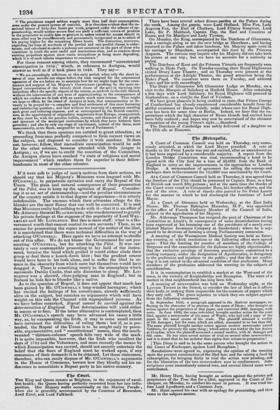If it were safe to judge of men's motives from
their actions, we should say that his Majesty's Ministers were leagued with Mr. O'CONNELL, to perpetuate agitation and carry the Repeal of the Union. The plain and natural consequence of their prosecution of the Pilot, was to keep up the agitation of Repeal. Consider- ing it as an act of statesmanship—and the peculiar circumstances of the country entitle it to that degree of importance—it is utterly indefensible. The excuses which their advocates allege for the blunder are the most flimsy that can well be conceived. It is said that Ministers really had nothing to do with it—that it is an affair of Mr. Attorney-General BLACKBIIENE; who was determined to gratify his private feelings at the expense of the popularity of Lord WEL- LESLEY and Mr. LITTLETON. But this is mere stuff: what is a Go- vernment worth that cannot control its own servants? Then, as an excuse for prosecuting the copier instead of the author of the libel, it is maintained that there were technical difficulties in the way of attacking O'CONNELL. Here again we have an attempt to shuffle out of this affair. We do not blame the Government for not pro- secuting O'CONNELL, but for attacking the Pilot. It was cer- tainly a very contemptible proceeding to lay hold of the instru- ment, because the hand which guided it would either elude their grasp or deal them a knock-down blow ; but the prudent course would have been to let both alone, and to suffer the libel to re- main in the obscurity from which none but themselves would have dragged it. There is something surely in the atmosphere which surrounds Dublin Castle, that sets discretion to sleep. Mr. LIT- TLETON was a shrewd, clear-judging man in England; but in Ireland he bids fair to blunder like a native.
As to the question of Repeal, it does not appear that much has been gained by Mr. O'CoNNELL's long-winded harangue; which has excited the feelings of his countrymen, already sufficiently alive on the subject, but contains no arguments which will have weight on this side the Channel with unprejudiced persons. As we have before remarked, Repeal cannot be carried against the determination of England. That determination will yield either to reason or to fear. If the latter alternative is contemplated, then Mr. O'CONNELL'S speech may have advanced his cause a little way, as, by exasperating the Irish, it may to some small extent have increased the difficulties of ruling them : but if, as is pre- tended, the Repeal of the Union is to be sought only by peace- able, argumentative, and " constitutional " means, then the much- vaunted "thirteen-column" speech falls very wide of the mark. It is quite impossible, however, that the Irish who recollect the days of 1782 and the Volunteers, and more recently the means by which Emancipation was carried, should not secretly entertain the belief that the fears of England must be worked upon, if any concession of their demands is to be obtained. Let those statesmen, therefore, who can easily dispose of Mr. O'CONNELL'S arguments in the House of Commons, beware how they blindly aid his en- deavours to consolidate a Repeal party in his native country.
















 Previous page
Previous page